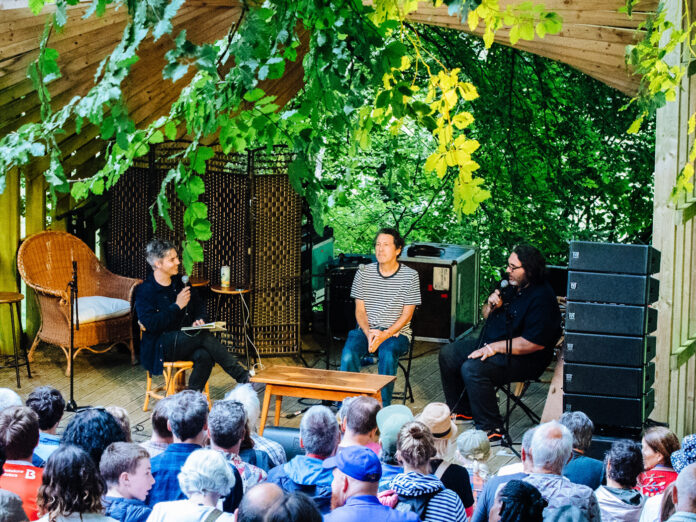When Yo La Tengo are having a shocker of a show, they don’t smash up their gear, abuse the audience or storm offstage to trash the dressing room. They simply, and very quietly, keep playing. In extremis.
When Yo La Tengo are having a shocker of a show, they don’t smash up their gear, abuse the audience or storm offstage to trash the dressing room. They simply, and very quietly, keep playing. In extremis.
“We were at loggerheads with this club all night, and they turned the lights on on us with 40 minutes before the bar time,” frontman Ira Kaplan told Uncut reviews editor Tom Pinnock during the final Uncut Q&A of End Of The Road 2024, recalling the first time they ever did their half-hour slowcore revenge set. “We went back onstage anyway and did a song or two and then announced we were doing one more song ‘So when you’ve had enough, go home’. Then we started playing ‘Speedy Motorcycle’… we finished the singing and got to this little guitar solo and it never ended. We were playing really quietly and gently but just wouldn’t stop playing. They cut the power and broke into our van later that night and stole something, so I think we showed them.”
As Ira and bassist James McNew explained to a rapt Talking Heads stage crowd, the shift towards lengthier, noisier works over their 40-year career was often driven by spite. “The first thing we ever did along those lines was captured on the President Yo La Tengo record, the live version of ‘The Evil That Men Do’,” Ira said. “If we were really mad at a club or the way they were treating us, we used to do ‘A House Is Not A Motel’ by Love and that ended with a little guitar solo and it was the same key as ‘The Evil That Men Do’, so we turned it into a medley. And on very special occasions that medley lasted for 35 minutes. But it was gradual.”
Click here for all our End Of The Road coverage
Such creative reactionism may have sprung from the band’s roots in the Manhattan no wave scene of the early 1980s. Ira recalled attending plenty of shows by the likes of Lydia Lunch and briefly acted as publicist for Z Records as it released her Queen Of Siam album in 1980. “I accompanied 8 Eyed Spy on a pretty ill-fated tour of San Francisco and Los Angeles,” he said. “It was exciting. Some of [the interviews] would go great and some of them were completely disastrous. Half the radio stations broke the record when she walked out, or before she left.”
Ira and his wife Yo La Tengo drummer Georgia Hubley, though, soon moved to Hoboken in New Jersey, he explained. “[Manhattan] just didn’t seem that nice a place to live for Georgia and my particular drug habits. We thought Hoboken would be more conducive. Like a lot of transplanted New Yorkers living in Hoboken we bristled any time somebody said we were from New Jersey. ‘No, we’re just stopping here for 30 years or so.”
It was at Hoboken venues like Maxwells, he said, that Yo La Tengo were allowed to become the band they are, unbothered by anything as intrusive as a paying audience. “One of the things that was attractive about [Maxwells] was that nobody went there,” Ira said. “I don’t see how our band could’ve ever existed without Maxwells because we were shy and incompetent [but] there’d be eight or ten people at a show, it was fun.”
Add numerous noughts and you’d be in the ballpark for YLT’s headline show at EOTR 2024, a festival they’ve played more than most since their first appearance headlining the second edition in 2007, and which – Pinnock asserted – allegedly inspired organiser Simon Taffe to start the event in the first place. Ira seemed bemused at the news. “And yet we were not here until the second one?”



